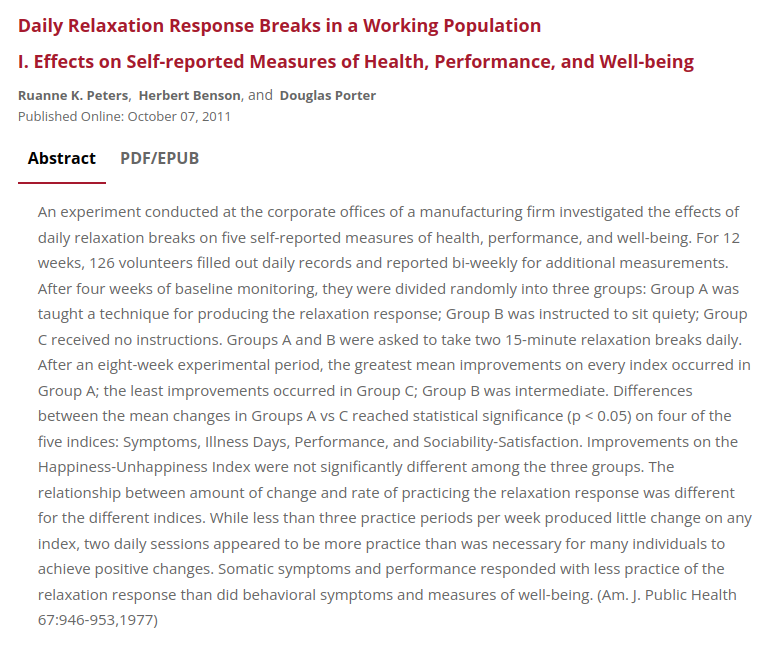An experiment conducted at the corporate offices of a manufacturing firm investigated the effects of daily relaxation breaks on five self-reported measures of health, performance, and well-being. For 12 weeks, 126 volunteers filled out daily records and reported bi-weekly for additional measurements. After four weeks of baseline monitoring, they were divided randomly into three groups: Group A was taught a technique for producing the relaxation response; Group B was instructed to sit quiety; Group C received no instructions. Groups A and B were asked to take two 15-minute relaxation breaks daily. After an eight-week experimental period, the greatest mean improvements on every index occurred in Group A; the least improvements occurred in Group C; Group B was intermediate. Differences between the mean changes in Groups A vs C reached statistical significance (p < 0.05) on four of the five indices: Symptoms, Illness Days, Performance, and Sociability-Satisfaction. Improvements on the Happiness-Unhappiness Index were not significantly different among the three groups. The relationship between amount of change and rate of practicing the relaxation response was different for the different indices. While less than three practice periods per week produced little change on any index, two daily sessions appeared to be more practice than was necessary for many individuals to achieve positive changes. Somatic symptoms and performance responded with less practice of the relaxation response than did behavioral symptoms and measures of well-being.
Daily Relaxation Response Breaks in a Working Population I. Effects on Self-reported Measures of Health, Performance, and Well-being
Publication
Am. J. Public Health
67:946-953
Abstract
Web and Email Links
Related Listings
Journal
Intelligence
High intelligence is touted as being predictive of positive outcomes including educational success and income level. However, little is known about the difficulties experienced among this population. Specifically, those with a high intellectual capacity (hyper brain) possess overexcitabilities in various domains that may predispose them to certain psychological disorders as well as physiological conditions involving elevated sensory, and altered immune and inflammatory responses (hype […]
Journal
Journal of Clinical Medicine
Stress is a term used to define the body’s physiological and psychological reactions to circumstances that require behavioral adjustment [1,2,3], and the relaxation response is a psychophysiological state that is opposite to that of the stress or fight–flight response [4]. A variety of mind/body techniques can be used to elicit a relaxation response and achieve the therapeutic effects associated with reduced blood pressure. For example, researchers at the Cochrane Review [5] investiga […]
Journal
Headache, the Journal of Head and Face Pain
PHYSIOLOGIC CHANGES consistent with the decreased sympathetic nervous system activity are present during the practice of a relaxation technique, Transcendental Meditation. The changes consist of decreased oxygen consumption, carbon dioxide elimination, respiratory rate and minute ventilation. Arterial blood lactate decreases markedly. Arterial blood pH and base excess decrease slightly. There are no changes in arterial blood pressure, in respiratory quotient, nor in rectal temperature […]

